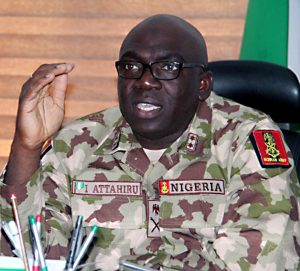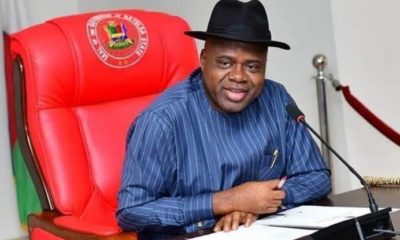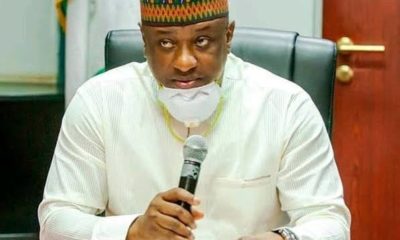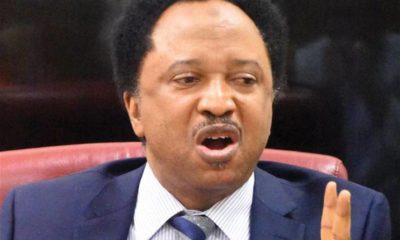NEWS
Nigeria confirms death of Military Chief in plane crash, President Buhari mourns
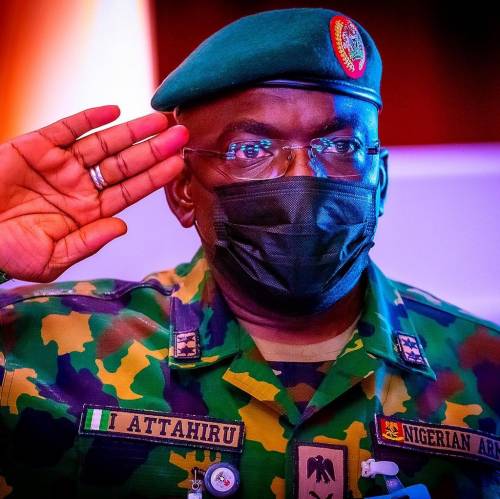
The crash which occurred around 6pm outside the Kaduna airport was said to have been caused by bad weather and heavy rains around the area.
Lieutenant General Ibrahim Attahiru was born on 10 August 1966 in Doka, Kaduna North Local Government Area, Kaduna State. He was a graduate of the Nigerian Defence Academy, Armed Forces Command and Staff College, Jaji and Nigerian Army School of Infantry. He commenced cadets training in January 1984 and was commissioned into the rank of Second Lieutenant in December 1986 as an Infantry Officer. He held a Masters degree in Strategic Management and Policy Studies from the Nigerian Defence Academy. Others include, Masters of Science in Human Resources Management and Development from Salford University in the United Kingdom and Graduate Diploma in International Studies from the University of Nairobi, Kenya.
Military career
General Attahiru has held several appointments on the staff, instructional and in command during his military career. He had a tour of duty with the United Nations in Sierra Leone as a Military Observer, where he facilitated United Kingdom military engagement, Operation BARASS in September 2000. He was an Operation Officer and later Company Commander in NIBATT 19 ECOMOG Operations in Liberia. Also, he had the unique privilege of having commanded with distinction all through the chain of command in the Nigerian Army. Prominent among these appointments are Commanding Officer 146 Battalion Nigerian Army (Operation HARMONY IV) in the Bakassi Peninsula, Commander 13 Brigade Nigerian Army (Operation PULO SHIELD), General Officer Commanding 82 Division Nigerian Army. He was one time Theatre Commander Operation LAFIYA DOLE (the Counter Terrorism and Counter Insurgency Outfit in North Eastern Nigeria). It is on record that he brought relative stability to the region with the surrender of several Boko Haram combatants.
As a staff officer, he was unit Adjutant, 7 Battalion Nigerian Army, Serti, Chief of Staff, 1 Brigade Nigerian Army Sokoto, General Staff Officer Grade 1 Training/Operations as well as Staff Duties/Plans at Headquarters 1, 2 and 81 Divisions of the Nigerian Army. He was Deputy Director Military Secretary 2 at the AHQ MS (A) and one-time Director Army Public Relations and Spokesperson of the Nigerian Army. He was later Director staff duties and Deputy Chief of Policy and Plans at the Army Headquarters. He was equally privileged to serve as Chief of Defence Transformation and Innovation and Chief of Defence Logistics at the apex organ of the Armed Forces of Nigeria, Defence Headquarters Abuja. In that position, he worked with the US Defence Logistics Agency on the Vertically Integrated Logistics Approach (VILA) Programme towards enhancing the operational readiness in the Armed Forces of Nigeria.
On the instructional, he was an Instructor at the Depot Nigerian Army, Nigerian Defence Academy and the Nigerian Army School of Infantry. He was later a Directing Staff and Chief Instructor at the Armed Forces Command and Staff College, Jaji – Kaduna.
Professional Career
General Attahiru has been exposed to leadership and professional development programs at globally renowned institutions. He was at the National Defence College, Kenya for the National Defence Management and Security Studies Course and at the Chinese People’s Liberation Army Special Forces Academy Shijiazhuang-Hubei Province, China for the Basic and Advanced Special/Operations Commando Forces Courses. He has undertaken leadership and security policy course at the prestigious Kennedy School of Government, Harvard University USA, Graduate School of Media and Communication, Agha Khan University of Nairobi, Bournemouth University Disaster Management Center, and the Geneva Centre for Security Policy.
NEWS
Moghalu Prescribes Good Governance As Panacea To Ethnic Agitation

The President of the African School of Governance, Kingsley Chiedu Moghalu has admonished state actors against resorting to brutal force in the bid to muscle out separatist agitators.
In the aftermath of Mazi Simon Ekpa, the Finland based Biafran nationalist agitator being caught in legal web and the Nigerian government moving swiftly to seek his repatriation, the former deputy governor of the Central Bank of Nigeria (CBN) has cautioned that ‘We either fix our problems, or our problems will eventually “fix” us. No alternative to a renegotiated union.’
ALSO READ: Finnish Police Arrest Simon Ekpa Over Terror-Related Allegations
The political economist, while expressing his hope in Nigeria, made it clear that “hope is not a strategy”.
He bared his mind in a series of posts on his verified handle on micro-blogging site, X on Friday.
Moghalu wrote, “Despite sustained contemporary difficulties, I am hopeful about Nigeria. But hope is not a strategy. We need to improve state capacity for effective governance.
“We either fix our problems, or our problems will eventually “fix” us. No alternative to a renegotiated union.
“We must learn to be honest with ourselves and address the root causes of our problems. Why ignore them, when the problem is actually quite solvable? The problem with continuing with this approach is that when the danger crystallizes, those who thought they were benefiting from
NEWS
N1.7trn Loan: Atiku Blames NASS For Worsening Nigeria’s Debt Burden
Former Vice President, Atiku Abubakar has criticized the federal government’s plan to secure an additional N1.7 trillion loan through Eurobonds to cover a shortfall in the 2024 budget, describing the borrowing as unsustainable and harmful to Nigeria’s economy.
In a statement shared on Thursday via his X (formerly Twitter) handle, Atiku accused the Bola Tinubu-led administration of burdening Nigerians with debt while failing to provide clear answers about the country’s fiscal challenges.
READ ALSO: CSR: Dangote Cement Fuels Education With Support Projects At Lagos Schools
He also faulted the National Assembly for enabling what he called a “voracious appetite” for loans.
The former Peoples Democratic Party (PDP) presidential candidate expressed alarm over a recent World Bank report ranking Nigeria as the third most indebted country to the International Development Association (IDA), calling the development troubling.
“The recent report released by the World Bank, showing Nigeria as the third most indebted country to the International Development Association (IDA), is very concerning,” Atiku stated.
He raised further concerns about the government’s decision to benchmark the proposed loan at an exchange rate of 1 USD to N800, despite the Central Bank of Nigeria’s official rate being over N1,600.
“What makes this particular loan proposal even more concerning is that it is benchmarked at the exchange rate of 1 USD to N800, whereas the current exchange rate from the Central Bank of Nigeria stands at over N1,600 to 1 USD,” he said.
Atiku questioned the need for additional borrowing, given the government’s earlier claims of record-high revenue collection.
“In July this year, Tinubu boasted that the FIRS and Customs under his watch had collected all-time high revenues to finance the budget. Why are they still borrowing?” he said
He accused the government of a lack of transparency, describing the borrowing spree as detrimental to Nigerians already struggling under economic hardship.
“There is something that they are not telling Nigerians, even as they are being crushed by a combination of their failed trial-and-error policies and loan rackets.”
Atiku also referenced a report by BudgIT, a budget monitoring group, which criticized the 2024 budget for its inefficiencies.
He alleged that corruption, rather than infrastructure or development needs, was driving the government’s borrowing decisions.
“These loans are powered by corruption and not for infrastructure and development needs. This voracious appetite for humongous loans is deeply concerning,” he said.
Reflecting on Nigeria’s financial history, Atiku lamented the return to significant foreign indebtedness just years after former President Olusegun Obasanjo’s administration cleared the country’s debt.
“It is agonizing to see that just a few years after the Obasanjo administration took us out of foreign indebtedness, we are today back at the top spot in the same conundrum,” he stated.
He called for a more cautious approach to borrowing, urging the government to prioritize fiscal responsibility and transparency to avoid worsening Nigeria’s economic challenges.
International News
ICC Issues Arrest Warrants For Israeli Prime Minister Netanyahu, Others
The International Criminal Court (ICC) has taken a historic step, issuing arrest warrants for Israeli Prime Minister Benjamin Netanyahu and former Defense Minister Yoav Gallant.
The charges include crimes against humanity and war crimes allegedly committed during Israel’s recent assault on Gaza.
In a detailed statement, the ICC accused the Israeli leaders of “intentionally and knowingly depriving the civilian population in Gaza of objects indispensable to their survival, including food, water, and medicine and medical supplies, as well as fuel and electricity.”
READ MORE: Osun Govt Decries Attempted Murder Of Park Mgt Chairman By Police
The ICC’s move marks a significant escalation in international scrutiny of the Israeli-Palestinian conflict. Netanyahu and Gallant are alleged to have orchestrated policies that caused severe harm to the civilian population in Gaza, leading to widespread condemnation from human rights organizations.
Alongside the charges against Israeli officials, the ICC also issued an arrest warrant for Hamas military commander Mohammed Deif. Deif has long been a central figure in Hamas’s military operations. Israel’s military claims to have killed him in a July airstrike, although this has not been independently verified.
The warrants highlight growing calls for accountability amid the ongoing conflict in the region. The ICC’s actions are likely to provoke heated debate and may complicate diplomatic efforts aimed at resolving the crisis.
With the warrants issued, global attention now turns to how the international community will respond and whether any practical steps will be taken to enforce them.

